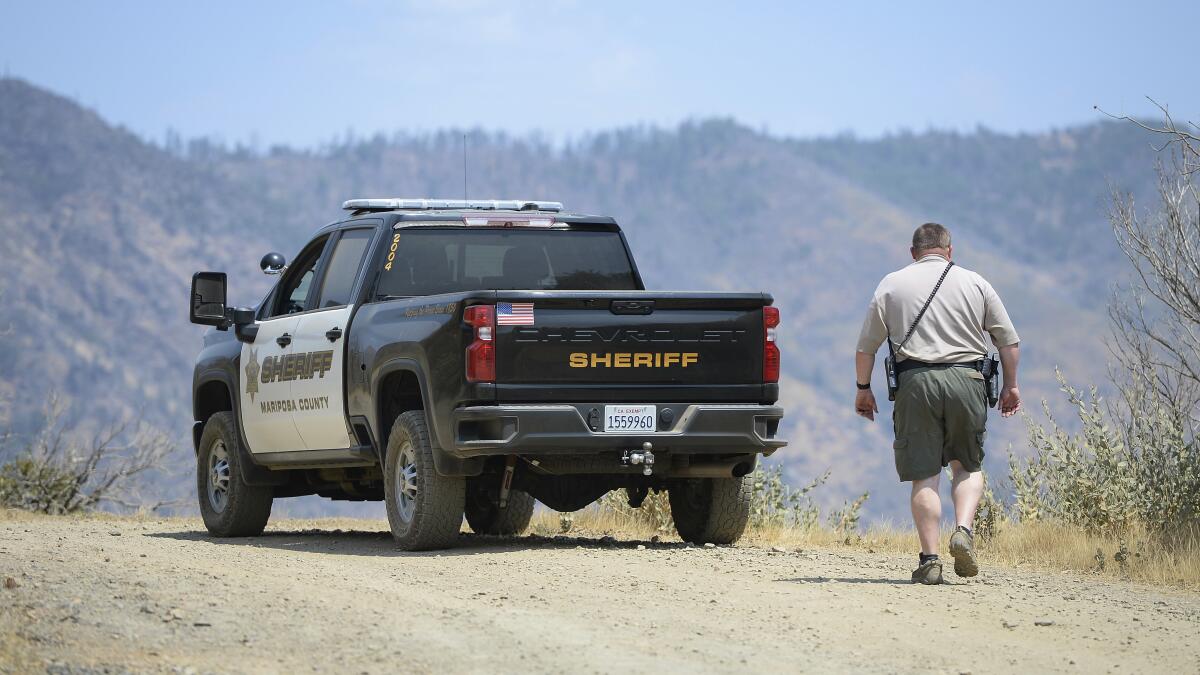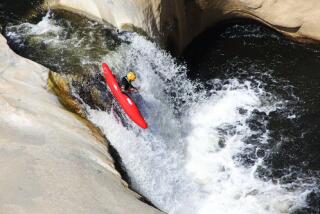Family of hikers found dead on remote Sierra trail likely killed by heat, dehydration

- Share via
Since the bodies of a baby, her parents and their dog were found on a steep hiking trail, this part of the Sierra Nevada has been gripped by the mystery of how they died.
A young family, seemingly fit and prepared, had perished on a well-marked trail along the Merced River’s south fork, with no signs of violence, a fall or another accident.
Even the dog had succumbed.
For two months, there were no answers, only theories — chief among them toxic algae.
On Thursday, Jeremy Briese, Mariposa County’s sheriff and coroner, gave a cause of death: heat-related illness and probable dehydration.
But questions about the family’s final moments and how they got into such a desperate situation less than two miles from where their car was parked may never be answered.
John Gerrish and Ellen Chung were experienced hikers who had recently moved to Mariposa from San Francisco after falling in love with the area.
On Aug. 14, Gerrish used a phone app to plan a hike in Devil’s Gulch, Briese said.
The next morning, the family got off to an early start. Their vehicle was spotted around 7:45 a.m. headed toward the Hite Cove trailhead, elevation 3,800 feet.
When they began the hike around 8 a.m., it was about 75 degrees.
They descended into the gulch, with daughter Miju in a baby carrier around one of her parents’ shoulders and Oski the dog following alongside.
A little more than two miles in, they veered onto a U.S. Forest Service trail running parallel with the Merced River’s south fork, Briese said.
They were now at a much lower elevation — 1,930 feet — with the temperature between 92 and 99 degrees.
By the time they met the Savage Lundy Trail, it was hotter still — 100 degrees.
The family had descended about 2,000 feet over about 4.1 miles. Now, they had to ascend what Briese termed “the steep incline.”
Savage Lundy, though short, is known to be challenging. Its south-southeast orientation exposes it to constant sunlight, and it is in the burn scar left by the 2018 Ferguson fire, so there is little shade, Briese said.
The temperature continued to rise, reaching as high as 109 by midafternoon.
The family had apparently brought only one water container to share among them. At some point, the extreme heat and the steep climb became too much.
The next day, Aug. 16, the family’s babysitter arrived, but no one was home, Briese said.
Friends were unable to reach Gerrish or Chung. They reported the family missing at 11 p.m.
Shortly before 2 a.m. the next day, a sheriff’s deputy spotted the family’s vehicle at the trailhead, Briese said.
At 9:30 a.m. Aug. 17, searchers found the bodies of Gerrish, Chung, Miju and Oski, 1.6 miles from their car.
The family carried one water bladder capable of holding 85 ounces in a backpack, Briese said. No other water containers or filtration devices were found.
Physical force and violence were quickly ruled out, as was toxic gas from a shuttered mine shaft. Lightning strikes were eliminated, and investigators considered suicide and drug or alcohol use before moving on.
The toxic algae bloom theory persisted, and investigators took water samples after high levels of the algae were detected.
After weeks of waiting, toxicology and other tests eventually ruled out the algae as the cause of death. Toxins were found in the river water, but there was no evidence any of the family members drank it.
Gerrish’s phone has been sent to the FBI for analysis, in hopes that it will yield more answers.
More to Read
Sign up for Essential California
The most important California stories and recommendations in your inbox every morning.
You may occasionally receive promotional content from the Los Angeles Times.











